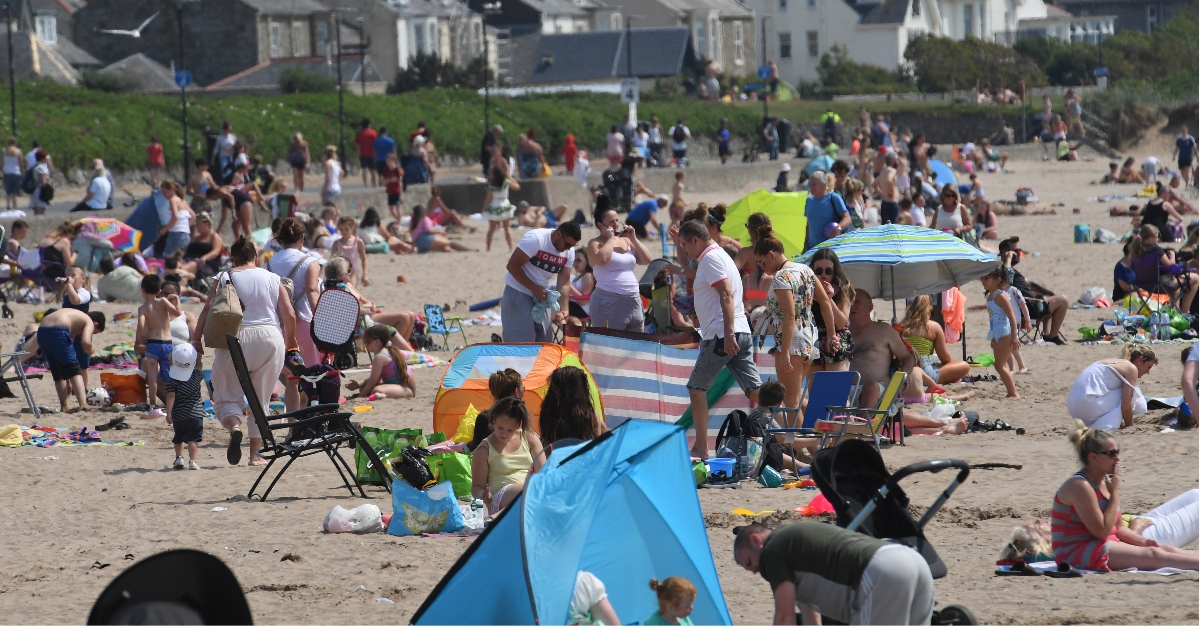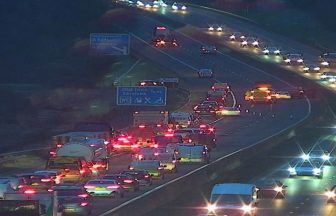Scotland is to officially become a tropical country with temperatures set to remain above 20C in some areas overnight.
The Met Office issued an amber weather warning for Tuesday in eastern, southern and central parts of Scotland, where the mercury is expected to exceed 30C.
STV meteorologist Sean Batty predicts the previous record temperature of 32.9C from 2003 will be broken, with parts of the Borders likely to achieve 33-34C.
He said temperatures may not drop below 20C, even at the top of Scotland’s Munros.
“Put quite simply, a tropical night is when the temperature doesn’t fall below 20 degrees,” he said.
“England has had about 20 tropical nights since 2018 as they become more common in a warming climate.
“We don’t really hear about them in Scotland, and that’s because we’ve only ever had one night, in July 2019, when Achnagart in the Highlands recorded a low 20.9C.
“A few places in central and southern Scotland may experience a tropical night tonight, but also, rather strangely, so could some of our mountains in the east and south-east.
“Very warm upper air will creep further north tonight pushing temperatures at places like the Cairngorm base station, which is at around 650 metres, into the low 20s overnight. Normally the overnight temperature here would be around 7C.”
Where is the amber warning covering?
The amber warning was extended on Sunday morning to cover Edinburgh, the Lothians, Fife, Perthshire and parts of central Scotland.
Temperatures have soared to as high as 30.6C in Edinburgh, with the Met Office saying there will be widespread impacts on people and infrastructure.
First ever red heat warning for England
It comes amid a UK-wide heatwave which could see the country have its hottest day on record this week, potentially reaching 41C.
A large part of England including London has its first ever red warning for extreme heat in place with record-breaking temperatures expected.
This has led to the UK Health Security Agency issuing its first level-four alert, which is described as a “national emergency”.
What are the dangers of hot weather?
The public have been warned to watch out for sunburn or heat exhaustion, with changes in working practices and daily routines recommended.
There is a possible risk of power cuts due to failures in heat-sensitive systems and equipment.
With more people likely to visit coastal areas, lakes and rivers, there could be an increased risk of incidents near water.
Those planning on travelling to the red warning areas down south should expect “significant disruption”.
The Scottish Environmental Protection Agency (Sepa) has issued a water scarcity warning to businesses for the east of Scotland, meaning businesses that extract water from the areas should do so only “if absolutely necessary.”
What about travel?
Speed restrictions are being put in place on key rail routes in Scotland to minimise potential damage due to extreme heat.
Network Rail confirmed train speeds would be restricted between 1pm and 8pm today, with a 20mph speed restriction on the stretch of rail between Hyndland and Finnieston in Glasgow, which is thought to be the busiest route in Scotland.
Restrictions are in place between Glasgow Central and Edinburgh Waverley; Dumfries and Carlisle as well as Glasgow Queen Street and Aberdeen; Inverness; Oban and Fort William and Edinburgh Waverley and North Berwick, with delays of around ten minutes expected, according to the ScotRail website.
The train operator urged passengers to “plan ahead”, tweeting: “Please please please, plan ahead if you’re out, it’s going to be extremely hot later today. Take water with you, wear sensible clothing – hats/sunglasses, if you’ve got elderly neighbours/relatives, check up on them.”

Can I leave work if it’s too hot?
Employers are legally obliged to ensure the temperature is reasonable as per the Workplace (Health, Safety and Welfare) Regulations 1992, though a maximum temperature has never been set.
If several employees complain, the employer is legally required to carry out a risk assessment. If it is not carried out, staff can refer to an industry regulator.
Otherwise, the Health and Safety Executive (HSE) recommend workers take regular breaks and drink plenty of water.
Sleeping in hot weather
Keeping your home cool is important for maintaining a comfortable temperature to sleep at night.
The NHS advise people to close curtains on rooms that face the sun to keep indoor spaces cooler.
Drink plenty of fluids throughout the day and avoid excess alcohol.
You can even try refrigerating your pillow for a little while before bedtime.

Taking care in the sun
To avoid sunburn, try to keep out of the sun between 11am to 3pm.
Walk in the shade, apply sunscreen regularly and wear a wide brimmed hat. If you have to go out in the heat, avoid exercising in the hottest parts of the day.
Look out for elderly or vulnerable people in the community who may be struggling in the heat.
Can we expect it to last?
While hot weather is expected to continue through tomorrow, no repeats are expected over the next few weeks.
Sean said that the temperatures will hit their peak tomorrow afternoon, with heavy thundery rain developing in the west and quickly move east tonight.
He added: “This sweeps away the extreme heat with a return to something more normal for July by Wednesday.”
Follow STV News on WhatsApp
Scan the QR code on your mobile device for all the latest news from around the country


 SNS Group
SNS Group

























